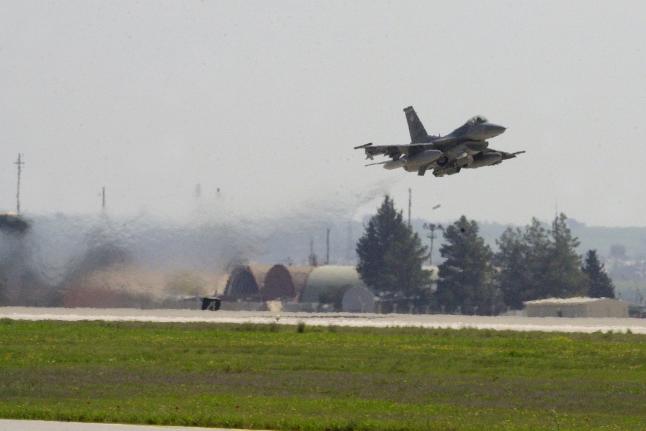Is Turkey Bombing The Kurds, Or Indeed The Islamic State?
Turkey bombs Islamic State targets

LONDON: Turkey -- that has thus far remained on the fringes of the coalition targeting the Islamic State -- carried out what it claims were air strikes against Islamic State (IS) group targets in Syria for the first time.
Prime Minister Ahmet Davutoglu said the airstrikes "completely destroyed" their targets.
However, he did admit albeit a little indirectly that the Kurd militants fighting the Islamic State were also a target. Davutoglu said, "Turkey cannot stand by as Kurdish, Leftist and Islamic State militants target Turkey. We will take necessary measures against whoever constitutes a threat to our border."
In an almost desperate statement the Kurdish National Congress has maintained that the Turkish fighter jets were bombing their ‘guerillas’ and the civilians in South Kurdistan that essentially lies in Iraq. “Yesterday on the 24th of July, at 10:55pm Turkish jets have bombed Kurdish areas (Xakurke, Qandil, Behdinan, Zap, Gare, Basye, Amedia, and Avasin) in south Kurdistan where mostly PKK guerrillas and civilians are situated. This attacks are still continuing.
The AKP government authorized Turkish military and air force to bomb these civilian areas, including in Xakurke and the Enze village in Qandil. Reports from local sources indicate that a number of civilians were injured during these attacks, with villages, farms and homes destroyed,” the statement read. Clearly according to this the Turkish targets were not what its government claimed to be the Islamic State, but really all those opposing the regime in Ankara.
The Kurds said that this attack was an attempt by Turkey to end the ceasefire porposed by their leader Abdullah Ocalan. And that the military attack followed “provocations” that failed to draw a violent reaction from the Kurds. The ongoing attack on Kurdish positions, according to the statement , “highlights that this policy of annihilation against the Kurds is still very much ongoing and on the agenda” of the Turkish government.
Interestingly, according to the Kurds--- a claim backed by the Syrian government as well---the collaboration between the AKP government of Turkey and the Islamic State is strengthening in Syria. The statement maintains, “the AKP government has supported ISIS militants in Syria to prevent the Kurdish efforts towards democracy and revolution in Rojava. This support by Turkey has included access to weapons, access to the Rojava-Turkey border crossings and extensive medical support for ISIS militants. This level of support is ongoing, and it is a mistake to believe that the limited bombings overnight in the Syria on selective ISIS weapons warehouses is an indication of Turkey’s shift in policy.”
The Kurds are clear that the ongoing assault by Turkey on the Kurdish guerilla bases “is to explicitly impair the Kurdish fight against ISIS. The attack over night against the PKK will only give ISIS a moral boost and support in its fight against humanity.”
The KNK has called on the Kurdish Regional Government (KRG), all Kurdish political parties, civil society groups and NGOs to stand against these attacks, “because this is not just an assault against the PKK but all Kurds.”
The Turkish police also launched raids against purportedly IS but largely Kurdish militants across the country, arresting 297 people. The arrests included members of the outlawed Kurdistan Workers' Party (PKK) and of a far-left group, the Marxist Revolutionary People's Liberation Party Front (DHKP-C).
Turkey’s response is located in the context of two incidents. On Wednesday, PKK's military wing said it killed two Turkish police officers. PKK also said that it collaborated with IS in the bombing of a Kurdish activists' group on Monday that killed 32 people. The suicide attack took place in the Turkish town of Suruc, just 10 km from the town of Kobani across the Turkish-Syrian border. The area has seen pitched fighting as Kobani has acquired centre stage in the battle against the Islamic State, with international-coalition backed Kurdish militias taking on the sunni militant group.
As Turkey confirmed that its fighter jets hit three IS targets in Syria -- the move marked a decisive shift in Turkey’s dealing with the militant group. Turkey also agreed to let the United States -- that is leading the coalition against IS -- to use the Incirlik airbase. The agreement was finalised in a phone call between US President Barack Obama and Turkish President Recep Tayyip Erdo?an on Wednesday and confirmed by US officials speaking on conditions of anonymity.
The decision to allow US warplanes to strike IS targets from its base in Incirlik provides vital airfields much closer to IS targets in Syria. The US has been pressurising Turkey to allow for the use of these bases, with Turkey thus far having resisted.
Turkey had in fact come under much criticism for its ambivalent stand. In December last year, protests broke out across the country and dozens died over the fate of Kobani which became the battleground between Islamic State militants and Kurdish forces.
In fact, Kurds in the region have consistently blamed Turkey for fanning IS, with Turkey being suspicious of Syria’s Kurdish militia the People’s Protection Units (YPG) and its political counterpart Democratic Unity Party (PYD) as they are the Syrian counterpart to the Kurdistan Workers Party (PKK) which has advocated Kurdish self-rule in Turkey since 1984.
Turkey’s ongoing military action appears to be targeted more against the Kurds than the Islamic State, however, with the latter being used as the cover to take out the separatist groups that have been seen as a threat ---of varying degrees--- by successive governments in Ankara.



